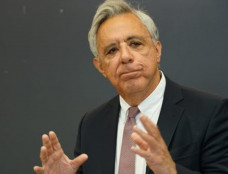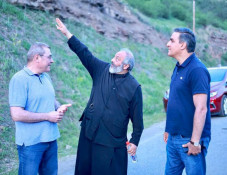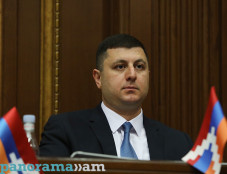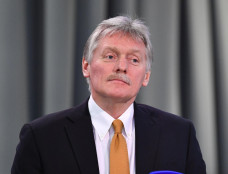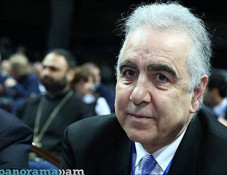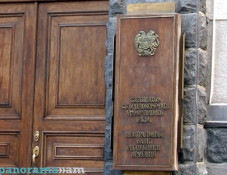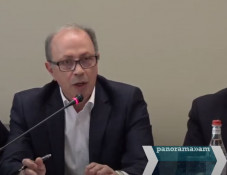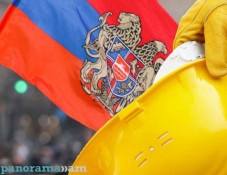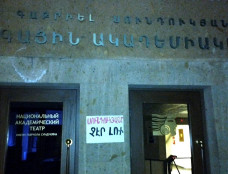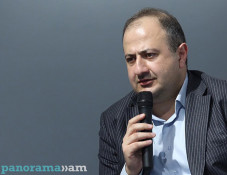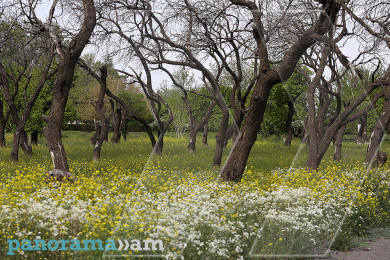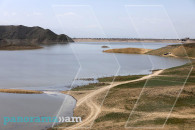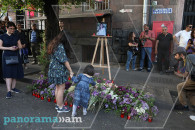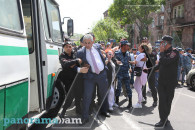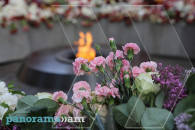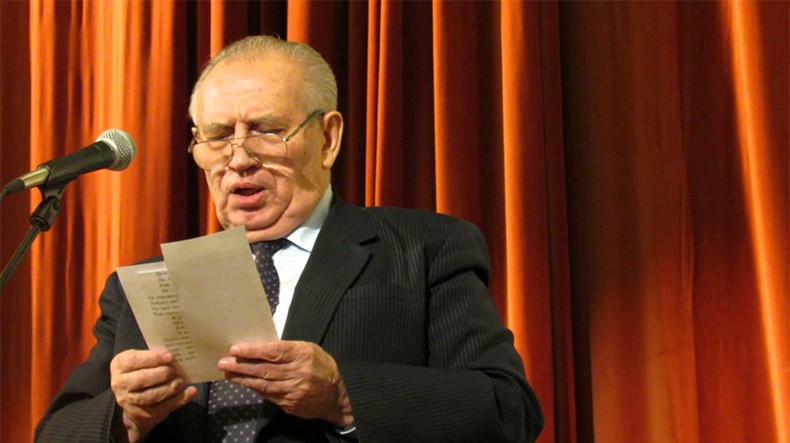
When the shooting will stop in Karabakh, Vladimir Kazamirov’s vision
Interview with the former chairman of the OSCE Minsk Group Vladimir Kazimirov published in Moskovsky Komsomolets newspaper.
- Vladimir Nikolayevich, you are a key participant to the peaceful settlement process of the Nagorno Karabakh conflict. Furthermore, you are the author of the 1994 Ceasefire agreement with no expiration date, which put an end to the war. Due to that agreement, relative peace was sustained until April of this year. Why was that peace broken?
- No doubt who was the initiator of the latest events. By the way, the Azerbaijani Ambassador to Moscow overdid things and let Baku leadership down. He directly told that Baku has the right to recapture those territories by military means. My opinion is that we have a great deal of signed documents ensuring to maintain the ceasefire regime. No need to sign new documents for that, yet some people may display such a desire.
The other story goes that not everyone expresses readiness to implement those agreements. As once HeydarAliyevput it, the conflict should be solved exclusively through peaceful means, while his offspring today hardly pronounces the words “preferable through peaceful means.” The way he acts, you saw on April 2. Today Ilham is mostly concentrated on the idea of eliminating the occupation of Azerbaijani regions around Karabakh. Those are 7 with 5 of them fully occupied and 2 others - partly. However, the fact is that Azerbaijan in no way wanted to cease military actions back thenin a hope to press Armeniasoon. Quite the opposite occurred and they were losing regions one after another.
- Why did the four UN Security Council Resolutions fail to stop the war?
-All of those resolutions failed and remained unimplemented. Unimplemented by whom? By Azerbaijan. In spring 1993 the Armenians captured Kelbajar (Karvachar). That successful operation ensured another link between Armenia and Karabakh apart from the Lachin corridor. Right after that Azerbaijan initiated a debate in the UNSC. Security Council adopted Resolution 822 over Karabakh on April 30, 1993. Baku hoped the resolution would contain provision on demanding Armenians to leave the Azerbaijani territories. However, Azerbaijani side didn’t take into account the circumstance that the mentioned provision would be preceded by a key demand – the immediate cessation of all hostilities and “hostile acts.” What do “hostile acts” imply if not the energy, economic and transport blockades of the Armenian territories. Baku did not expect that. All the four UNSC resolutions set the key demand - specifically, the cessation of the fire. Azerbaijan though lived in illusions they could deal with the Armenians through force. Its potential was rather impressive as compared to that of Armenia - equally on terms of the territory, population and military capabilities. As after the dissolution of the Soviet Union, Azerbaijan inherited more military equipment than Armenia. For example Aghdam storages were considered to be the strategic reserves of the Soviet army in the Caucasus. Azerbaijan had about 16 airfields, while Armenia – only 2-3. However victory does not come thoroughly merely based on potential. After resolution 822 was adopted managed to convince Americans and even the Turks. And we altogether - Russia, the US, and Turkey - called upon the three parties to the conflict in a written enquiry: “Are you ready for the full implementation of the resolution 822?” Yerevan and Stepanakert gave their consent, yet Baku preferred to not respond to the question at all. That was the reason the war didn’t stop. Any actually all of the four UNSC resolutions were downgraded. The Security Council didn’t want to proceed with the fifth resolution out of a possible damage to its reputation, as the previous resolutions were not implemented. That was the reason we could not take the SC resolution as the base for the ceasefire agreement. We had no way but to invent another base.
-What legal base do you mean?
- In March and April 1994 two summits of the CIS Council of Heads of States were held in Moscow. I held preliminary consultations at the first meeting and prepared a text for the statement of the Council of Heads of States during the second meeting on April 15. The statement called for an immediate cessation of the military operations. We created a fulcrum - document to be worked on.
- What was the role of Bishkek Summit?
- We convened the CIS Inter-parliamentary Assembly in Bishkek on May 5. They signed Bishkek Protocol urging to stop military actions. I wanted to play around the Victory Day, and a suggestion came to cease the fire on the night of May 8-9. That didn’t work. Heydar headed for Brussels to sign Azerbaijani participation in the NATO Partnership for Peace program. Parliament speaker RasulGuliyev stayed as the responsible body in the state. Therefore, Vice Speaker Jalilov visited Bishkek. He tried to place the rights of the Azerbaijani community of Karabakh in par with those of the representatives of the Nagorno Karabakh itself. But Armenians were struggling with Baku not the Azerbaijani community, which fled the region by that time. That circumstance extended deadlines. I had to visit Baku on May 9, and they finally signed the Bishkek protocol, Jalilov refused to do so in Bishkek.
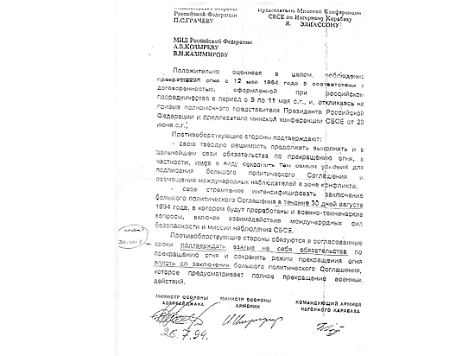
-What significantly new provisions did those documents contain?
- We amended another demand absent in the UNSC resolution. We demanded not only the cessation of the fire but also envisaging a mechanism, ensuring the non-resumption of military and hostile activities. Without that (That is to say without envisaging a mechanism, ensuring the non-resumption of military and hostile activities) no way to move to the elimination of the consequences of that tragic confrontation.” What does this mean? Liberation of occupied territories will be possible only after a mechanism strengthening the ceasefire regime is established. This appears to be the basic concept the Karabakh settlement rests upon. Baku formulates the issue in a way that suggests, “Give us the occupied territories without any commitments. ” That includes no commitment with regard to the Karabakh status and non-resumption of the military actins. While the Armenian side, which was also shared by us, was the need to strengthen ceasefire regime first, to exclude any possibility of resuming military actions. Whenever that occurred the Armenians would be ashamed to keep occupied territories.
- Could you share in detail how the ceasefire agreement was reached?
- I was in Baku on May 9, 1994 and was drafting the text of the agreement. The problem was that HeydarAliyev in no way wanted to sign an agreement with Nagorno Karabakh over the ceasefire. He wanted to sign an agreement with Yerevan, since Armenia is a recognized state. He didn’t want to recognize Karabakh as a party to negotiations.
On the other side, at that time Armenia was reluctant to sign the agreement, Yerevan pretended it was not a party to the conflict, they solely assisted Nagorno Karabakh and the war was not with them. That is a misleading position.
As deemed the configuration of that conflict has three parties involved. At the military dimension Karabakh and Yerevan Armenians struggled jointly. At the political dimension Yerevan and Stepanakert had major discrepancies, sometimes-even contradictions were not avoided.
That was the reason one should acknowledge that Nagorno Karabakh is a separate party to the conflict. Azerbaijan didn’t like that for sure as Karabakh was its former autonomous region.
-It happened that Baku previously signed agreements with Nagorno Karabakh didn’t it?
- Yes, dozens of agreements exist which have been signed between Baku and Stepanakert, without Yerevan’s participation. They signed only three documents with Yerevan. That means when Azerbaijanis were pressed they were forced to sign preliminary ceasefire agreements directly with Nagorno Karabakh, while when the full cessation of the fire was negotiated, HeydarAliyev became staunch and insisted on the opposite. He asked me to contact Yerevan once again. I did so – not only at his request but rather that was in line with our understanding and vision that all the three parties should sign that agreement. After an hour and half I received a call from Yerevan giving consent to signing the document.
Look at the document. The text was written on computer and the words “Minister of Defense of Armenia” were added by my hand. The current Armenian President, then Karabakh Defense Minister SerzhSargsyan signed the agreement on behalf of the Armenian side. He even introduced two amendments. The agreement over those amendments would take two months in different situation. But the Armenians pushed Azerbaijanis against the wall.
-Was Azerbaijan losing on the frontline?
- The danger was that Armenians were about to reach Kura River, which could result in severing northwest of Azerbaijan from the rest of the country. The history of a year ago could repeat itself, when Armenians reached Araksriver bordering with Iran. And the southwest territory of Azerbaijan was severed. That time the civilian population and the militaries fled through Iran. Heydar would be toppled in case of a repetition of the situation. That was the reason the Azerbaijanis agreed to those amendments immediately. Defense Minister MamedrafiMamedov signed the agreement in Baku on May 9, then it was signed in Yerevan by SerzhSargsyan on May 10 and in Stepanakert - by the Commander of the NKR Army SamvelBabayan on May 10.The text of the agreement was duplicated on three sheets for separate signatures for each of the parties. I returned to Moscow from Baku with “Azerbaijani” version, the other versions were sent through fax. Thus, those three sheets with signatures served as the ceasefire agreement, which entered in force on May 12. This was unprecedented in the international practice. The legal certainty implies the document to be signed on the same day at the same place. Here we had three different days and three different points of signature. However, that was dangerous to postpone the signing of the agreement. One of the parties could record a success on the frontline and all the process was to be done once again.
- It appears that the Karabakh ceasefire agreement was facilitated due to Russian mediation. How did western partners react to that?
- They were envy of that. They tended to push out Russia from the South Caucasus. During one of my trips to Yerevan Armenian then president LevonTer-Petrosyan told me he received a call from Swedish diplomat Jan Eliasson serving as Chairman at the Minsk Group that time. The diplomat suggested “prolonging the ceasefire for 30 days.” I was shocked, saying: “LevonHakobovich, what does it mean to prolong the ceasefire for 30 days?” The agreement has no expiration date.” There is a term in diplomacy called “by default”. That is to say if no date is indicated in the document, the agreement has no expiration date. Prior to that, we had 10-12 agreements over temporary ceasefire with all of them containing dates. While in this case we seemed to have forgotten about the date. That was done deliberately. HeydarAliyev by the way agreed to that. While the westerners tried to take away that diplomatic victory from Russia with transferring it to the Minsk Group, which was certainly dominated by the Americans. Ter-Petrosyan agreed with me.
I replied with another suggestion to him in order to completely bury that awkward idea.
“Let us agree upon an initiative for the representatives of the three conflicting sides– Armenia, Azerbaijan and Nagorno Karabakh – periodically affirm the ceasefire regime and reiterate their commitment to adhere to that agreement up until the comprehensive political agreement over the full resolution of the armed conflict is reached.” Ter-Petrosyan gave his consent. I contacted Baku and Stepanakert. I presented the first draft of the document to them. The document envisaged not only the cessation of the hostilities but also contained a reference to the commitment to adhere to it until the political agreement is reached to be periodically confirmed by the parties to the conflict.The Azerbaijani side signed it on July 26; other signatures followed the next day. The text of that document never was published. I present it to you. Actually that was an antidote to Washington attempts to take away the reached agreement from Russian through Swedes.
- What was the reason the document remained unpublished?
- The Armenians a bit exaggerated its significance. That was the first time an Azerbaijani signature was put aside with that of Karabakh representative on one paper.
-Why weren’t any peacekeepers deployed in Karabakh?
- It was evident that Russian peacekeepers were to be deployed there. The west was not interested in that, as the move would serve to Russia’s reputation and leverage. The Armenians had no objections to the peacekeeping forces. Azerbaijanis simultaneously agreed and rejected that. Later on the OSCE tried to take the idea of deploying Russian peacekeepers from Russia. In December 1994 in Budapest the OSCE Summit was convened. The final declaration contained a provision about deploying peacekeeping forces. The provision implied OSCE peacekeepers to be deployed. Although other states were not ready for providing forces for that, the move came to block possible deployment of Russian peacekeepers.
-When I was in Karabakh I was truly impressed by the situation there. The confronting armies stand face to face within a close distance with no peacekeepers in between. That is rather dangerous.
-Yes, the positions are close which is a reason for number of incidents. Before the ceasefire agreement, on February 18, 1994 Defense Minister PavelGrachov held a consultation with the Armenian and Azerbaijani Defense Ministers, with the participation of the Karabakh representative. I was also present at the meeting. The protocol of the meeting read that the sides would remove the troops from the borders after the ceasefire is reached. Azerbaijani Defense Minster Mamedov put his signature as well. After some time, Mamedov asked me: “No, that is Armenia, that should move away, as they have entered into our territory, while we will stay in our positions.” Thus, he left the commitments made. The removing of the troops didn’t happen. The point is that Armenians entered into their territory as Azerbaijanis in no way wanted to cease the military actions.If they ceased military actions after SC resolution 822, only Shusha (Shushi), Lachin and Kelbajar (Karvachar) would have remained under what they called “Armenian occupation”, now those regions are seven. After that, another agreement was reached. Azerbaijan even refuses that document was ever existed, although that was worked out with the personal participation of HeydarAliyev. Do you think Ilham is committed to that in any way? No, absolutely. That is the 1995 agreement on strengthening the ceasefire. The documents sets in detail what steps should a side to take in case of an incident from the other side. The incident should not be communicated to media for 6 hours. A whole set of measures are envisaged to be implemented. Thus, refusing from any agreement is regretfully appears to be a notorious tradition of the Azerbaijani side.
-Some people may accuse you of having pro-Armenian position.
- Do not consider me as an enemy to Azerbaijan. I had severe confrontation with the Armenians. Once even a shooting happened.In November, 1993 I took the updated draft agreement to Baku. I was scheduled to visit Baku first, then Yerevan and Stepanakert. I was asked to stay in Baku for a week. The schedule was extended. It was not allowed to fly to Yerevan from Baku directly. I had to return to Moscow and then fly to Yerevan. Then I suggested to HeydarAliyev: “In order to reduce the time, let me cross the Line of Contact.” I was given a car and when we reached the place it was getting dark. The Azerbaijanis refused to accompany me and I spent a night there. In the morning Azerbaijanis suggested me another site to cross the Line of Contact. There were no mobile phone then and I couldn’t contact Yerevan being under the total control of the Azerbaijani side. It turned out fighting and destroyed settlements were at the place. The Armenians didn’t want me to see those and they objected to my crossing through that specific area. Anyway, we went through. We stood,an Azerbaijani Commander of Battalion told hewould send a Jeep to arrange the issue with the Armenians. We were standing there when a shooting started. First, gunfire and then mortars followed. The Armenians hit the Jeep. We were standing behind the hill, didn’t suffer, although couldn’t cross. That was a great scandal, and Foreign Minister AndreyKozirev called a press conference.
- What are the perspectives of the Karabakh conflict settlement?
- Most people support the idea that the people of Nagorno Karabakh should decide their own future. In case of a referendum its outcome seems obvious, even if we consider that Azerbaijanis who left Karabakh would participate in the referendum, (although all of them have settled in some other places) the absolute majority will vote for the independence. That is the reason Ilham does not want any referendum at all, saying, “That is our territory – give it to us.” Moreover, in 1995 at the time of HeydarAliyev Azerbaijan adopted a new constitution, which envisages that any referendum is to be carried out by voting of the whole population. Therefore no referendum is permitted according to Azerbaijani laws. Is this consistent with the international practice?
During referendum in Quebec, only population of Quebec participated - not the whole Canada. In Scotland referendum only the population of Scotland voted - not the whole Great Britain. If a referendum took place in Catalonia, the population of Catalonia would vote - not the whole Spain. Neither Spain, nor Azerbaijan want those referendums as their outcome is obvious This is to be the crux of this conflict.
Newsfeed
Videos







